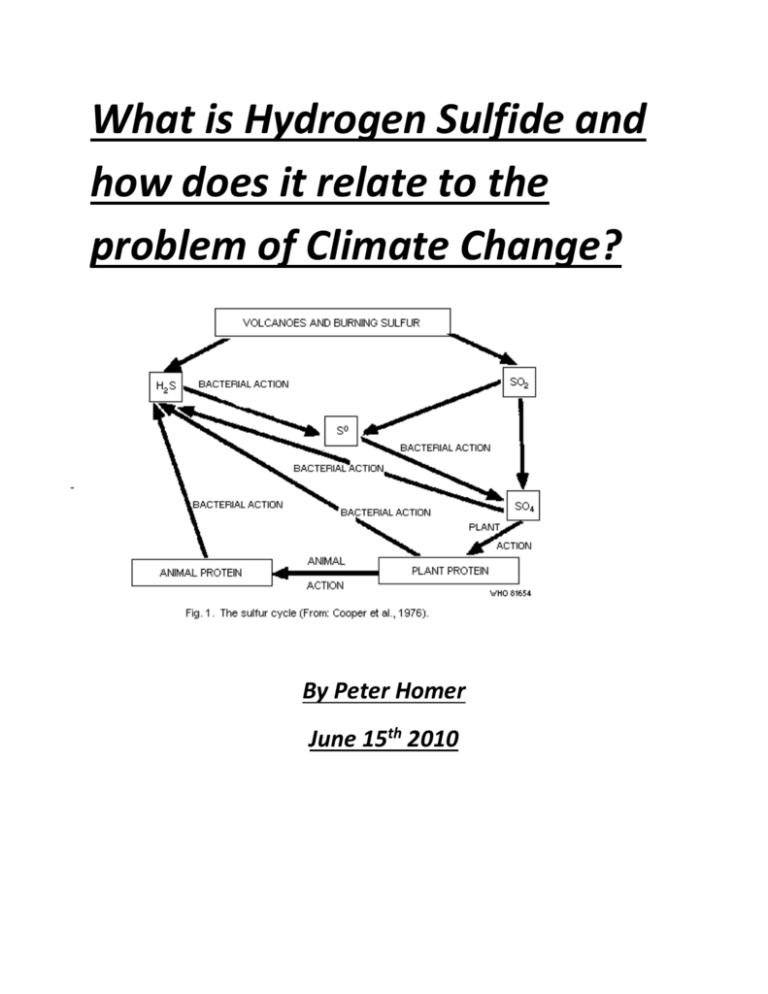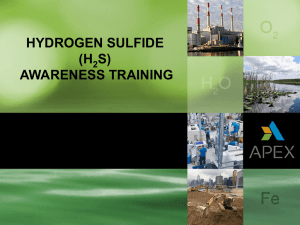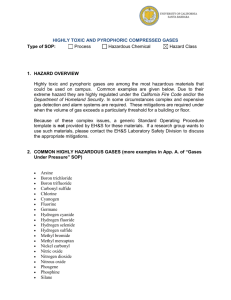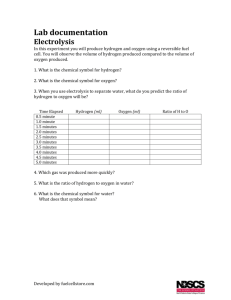What is Hydrogen Sulfide and how does it relate to the
advertisement

What is Hydrogen Sulfide and how does it relate to the problem of Climate Change? By Peter Homer June 15th 2010 What is hydrogen sulfide and how does it relate to the problem of climate change? Hydrogen Sulfide is the chemical compound with the formula H2S. It is a colourless, very poisonous, flammable gas with a foul odour of rotten eggs. It often results from the bacterial breakdown of organic matter in the absence of oxygen, such as in swamps and sewers. It also occurs in volcanic gases, natural gas, and some well waters. The body produces small amounts of Hydrogen Sulfide and uses it as a signalling molecule. Hydrogen Sulfide is slightly heavier than air; a mixture of H2S and air is explosive. Hydrogen Sulfide can burn with oxygen and form Sulfur Dioxide or water. Sulfur dioxide is a very bad smell that burns slowly. Scientists are saying that Hydrogen Sulfide is killing lots of people and can be very bad for you. Hydrogen Sulfide is also a by-product of some reactions and caution should be used when production is likely as exposure can be fatal. Small amounts of hydrogen sulfide occur in crude petroleum, but natural gas can contain up to 90%. Volcanoes and some hot springs (as well as cold springs) emit some H2S where it probably arises via the hydrolysis of sulfide minerals. About 10% of the total emissions of H2S are due to human activity. By far, the largest industrial route H2S occurs in petroleum refineries. Hydrogen Sulfide is highly flammable, very toxic and dangerous for the environment. Hydrogen Sulfide is most commonly obtained by its separation from sour gas, which is natural gas with high content of H2S. It can also be produced by reacting hydrogen gas with molten elemental sulfur at about 450 degrees Celsius. Hydrocarbons can replace hydrogen in this process. Hydrogen Sulfide is considered a broad-spectrum poison, meaning that it can poison several different systems in the body, although the nervous system is most affected. It forms a complex bond with iron in the mitochondrial cytochrome enzymes thereby blocking oxygen from binding and stopping cellular respiration. Hydrogen Sulfide relates to climate change because of the oil spill off the Gulf of Mexico and since Hydrogen Sulfide occurs from bacterial breakdowns and lack of oxygen. This is a picture of the oil spill in the Gulf of Mexico. Oil spills into rivers, bays, and oceans usually involve tankers, barges, or refineries. Oil spills are not always caused by human mistake however; sometimes machinery breakdown which can cause oil to pill and out into the surrounding environment. If an oil spill occurs in the ocean, the oil itself will float in salt water. Sometimes oil will float on fresh water. Believe it or not, this is a good thing. This means that the oil is confined to the surface of the water, which makes containing the spill a little easier. Hydrogen Sulfide is very bad for the environment but sometimes it can be a good thing. It can be a good thing because Hydrogen Sulfide can burn with oxygen to form sulfur or water which the Earth is lacking. The yellow stuff that you sometimes see when it is sunny then it rains, that is Hydrogen Sulfide. Reference List http://dictionary.reference.com/browse/hydrogen+sulfide, May 21, 2010. http://en.wikipedia.org/wiki/Hydrogen_sulfide, May 21, 2010. http://www.michigan.gov/deq/0,1607,7-135-3311_4111_4231-9162-,00.html#15._Who_regulates_air_emissions, June 3, 2010. http://oceanworld.tamu.edu/resources/oceanography-book/Images/ixtox1.jpg, June 4, 2010. http://www.wired.com/science/planetearth/news/2008/03/peter_ward_qa?curren tPage=all#, June 4, 2010. http://www.articlesbase.com/environment-articles/how-do-oil-spills-happen10934.html, June 8, 2010.






